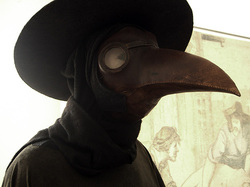
Figurative Language Assignment:
1. Choose one particular example of figurative language (metaphor, simile, image, personification) that you enjoyed from Act I of Hamlet.
2. Share the example, using proper citation format (if you're not sure how to cite Shakespeare, look it up! There are many resources available on the web, including Purdue Owl).
3. Write a brief reflection on why you enjoy this example, and briefly analyze what themes or issues are illuminated by this particular piece of figurative language.
Due: by midnight on Sunday, Feb 12
Bonus Question!!! Mystery Image (above): What is portrayed in this image? How might it be connected to any of the themes we've seen in Hamlet? Discuss in comments if you wish. All will be revealed in class on Monday.
** Casey, this one's for you! :)
 RSS Feed
RSS Feed